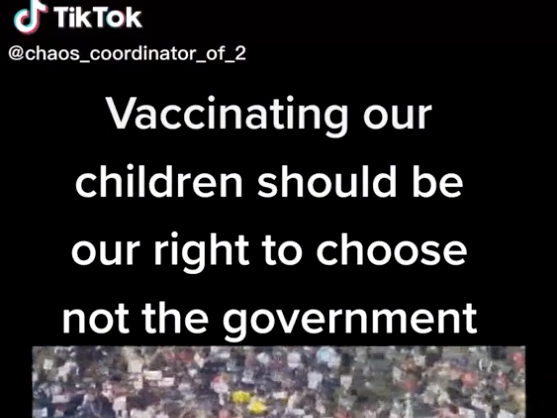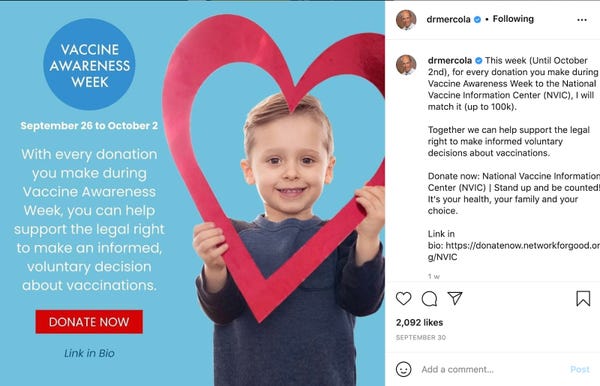Anti-Vaxxers Are Targeting Mothers Again, Under Facebook’s Nose
- Before the pandemic, anti-vaxxers used to target mothers of young children almost exclusively.
- During the pandemic, they began to target right-leaning adults.
- Now, posts meant to scare moms are evading anti-vax policies and showing up on Facebook and TikTok.
Lydia G. sat next to her children in the waiting room of a public health clinic in Alberta, Canada. She had taken an Ativan to ward off her growing anxiety before coming in that morning.
The office was warm, with colorful, kid-friendly posters on the wall. The nurses at the front desk were kind. Still, she was nervous: After a decade of adamantly believing that vaccines were dangerous to children, she had come, during the COVID-19 pandemic, to get her kids up to date on their shots.
Lydia, whose identity is known to Insider but who requested anonymity to protect herself and her family from harassment, broke out of her echo chamber after years of being a prolific anti-vaccine advocate in online forums and Facebook groups.
She’s one of the few anti-vax mothers who have changed their minds and try to persuade others to do the same.

Her story points to a unique situation going on in anti-vax circles today. Although politically left-leaning young mothers have traditionally been a main target of anti-vaccine propaganda, for much of the past year, the focus of anti-vaxxers shifted to right-leaning adults.
But now that the Food and Drug Administration’s vaccine advisors have voted in favor of granting Pfizer’s request to administer its COVID-19 vaccine to children ages 5 to 11, anti-vaxxers are ramping up to again target young mothers, researchers said.
They are stoking mothers’ fears on social media with misleading posts and stories on Instagram, linked articles in private Facebook groups, and videos on TikTok. And because of the pandemic, they have a potentially wider audience for their disinformation than ever before, researchers said.
These aren’t just groups of people privately validating each other’s fears. Many groups are made deliberately by those who seek to profit, researchers said, and they are cleverly slipping through social-media companies’ nets.
From left to right for anti-vaxxers
Twelve people were responsible for over 65% of vaccine misinformation posted to large social-media platforms, said a March report by the Center for Countering Digital Hate. CCDH, which describes itself as a nonpartisan, nongovernmental organization, is a UK nonprofit founded by Imran Ahmed, a former advisor to several Labour Party candidates.
CCDH labeled these people the Disinformation Dozen. Many of them still push a widely debunked study by Andrew Wakefield that alleged that the childhood measles, mumps, and rubella vaccine was linked to autism.
During the pandemic, these actors seized on COVID-19 to fearmonger against vaccines to a new demographic: right-wing, anti-authority people who opposed mask mandates and social distancing in the US. These tactics helped recruit new subscribers for their social-media empires and newsletters.
Mothers weren’t the initial targets of COVID-19 anti-vax misinformation because the COVID-19 vaccines were initially approved only for adults. Anti-vaxxers changed strategies, focusing more on messages of threats to personal freedoms, Lydia said.
“The anti-vax movement seems to be tied more politically now, and it has definitely shifted to be right-leaning,” she said. Lydia added that when she first got involved, it was much more aimed at “hippie, crunchy granola” parents.
But the actors are once again vigorously targeting mothers. And in right-leaning mothers, they have a whole new crop of moms to pursue.
“Women often make the health decisions for the family, for the kids,” said Dr. Kolina Koltai, who researches vaccine misinformation on social media at the University of Washington.
Koltai said a great deal of this targeted misinformation relied on manipulative and false ideas of child safety by implying that COVID-19 vaccines were risky and telling mothers that to be a good mom, they shouldn’t risk the vaccines.
Outwitting the bots
Koltai said it’s difficult to document exactly how much misinformation targeting mothers exists on Facebook, Instagram, and other platforms because some of it is posted within private Facebook groups and on Instagram stories that disappear after 24 hours.

Also, someone whose account is largely focused on a different topic, such as natural or healthy parenting, may create only a few posts that link to anti-vax pages — another tactic that makes the posts harder to discover.
And links posted in Instagram comments often lead to blog posts hosted on other websites, so they can easily be missed by the social-media site’s automated fact-checking algorithms, Koltai said.
But much of it isn’t hidden: “Basically, you can just throw a rock and find it,” she added.
Facebook said it removes posts and accounts that violate its policies, and that it redirects hashtag searches for “#vaccines” and “#covid19” to official government-linked health information and pages.
“Since the pandemic began, our goal has been to promote reliable information about COVID-19, take more aggressive action against misinformation, and encourage people to get vaccinated. So far, we’ve connected over 2 billion people to authoritative information from health experts, removed 20 million pieces of COVID misinformation, and labeled more than 190 million pieces of COVID content rated by our fact-checking partners,” a spokesperson told Insider.
Some of these actions sent anti-vaxxers to work on alternative social-media platforms, such as Telegram, that have looser content rules.
But many continue to post on large platforms and frame anti-vaccine content through the lens of subcultures, such as natural wellness and parenting, while using coded language, such as the term “jab,” to avoid being detected, researchers said.
“Talking about health freedom doesn’t necessarily violate a policy,” Koltai said.
And many of these pages haven’t been banned. CCDH told Insider that as of the end of September, Facebook had removed 18 of 35 accounts held by the Disinformation Dozen, and that Instagram had removed 17 of 30 accounts.
Facebook disputed the CCDH’s research about how responsible the Disinformation Dozen were for the spread of anti-vax misinformation, and it insisted that removing those users wouldn’t end the tide of it. A spokesperson also said, citing surveys of Facebook’s US users, that COVID-19 vaccine “hesitancy” had declined by half since January. That data also showed that of the people who said they weren’t already vaccinated as of early October, 87% of the men and 83% of the women said they would probably not or definitely not get vaccinated.
Insider finds misinformation in 10 minutes
Insider was able to find Instagram posts in violation of the company’s policies within 10 minutes of searching through the hashtags “#healthykids” and “#parentschoice.”

Facebook said the posts Insider found were insignificant. “The few posts cited for this story are in no way representative of the hundreds of millions of posts that people have shared about COVID-19 vaccines in the past months on Facebook and Instagram,” a spokesperson said.
But Koltai explained how these campaigns were skillfully sidestepping Facebook’s mechanisms.
“Right now on Instagram, everything is around this idea of mandates,” she said. The most popular recurring themes in these posts relate to vaccine requirements for work and schools.
This trend is reflected in anti-vaccine TikTok videos as well, which Insider found within minutes using the hashtags “#medicalchoice” and “#momsforliberty.”
A spokesperson for TikTok said: “TikTok follows the advice of health experts as we work to counter misinformation about vaccines and COVID-19. As we take action on content and accounts, we also provide our community with access to authoritative information about COVID-19 directly within our app.”

But researchers didn’t expect the anti-vax crowd to stick to issues of personal freedom and believed they would soon circulate misinformation around medical or safety claims.
“As we start getting closer to actually having these vaccines for kids, we might see these ideas around kids and side effects again,” Koltai said.
Other disinformation researchers agreed. “This is an opportunity for the anti-vax movement to return to the tactics it’s very familiar with,” said Callum Hood, the director of research at CCDH.
“The big rhetorical point that they rely on is this well-worn fact about COVID, that it’s not that dangerous to kids,” Hood said. “But it does kill children and make children very, very ill. While the risk might be smaller, the importance of that risk is large.”
In an exclusive report shared with Insider, CCDH researchers identified multiple posts on Instagram that said COVID-19 vaccines were hurting children, created by groups run by prominent anti-vaxxers.
Two of these posts — created by members of the Disinformation Dozen Joseph Mercola and Robert F. Kennedy Jr. (through his organization the Children’s Health Defense) — included calls for donations, signaling that these actors were fundraising off parents’ fears.

Once those pushing anti-vax messages identify a social-media user who interacts with milder fear-based messages about their kid’s health — such as a post labeled “Vaccine Awareness Week” — they start sending those people more anti-vax content, reinforcing their fear.
“You think there’s all this information out there being hidden,” Lydia said. “But it’s actually just an algorithm curating this. It’s trying to please us so that you keep going back.”
The organizations creating these posts, not surprisingly, disputed the researchers. For instance, a spokesperson for ICAN disputed the characterization of its posts as misinformation. A spokesperson for Joseph Mercola disputed the CCDH’s research and said their posts were “about empowering individuals with the ability to be educated and make informed medical choices for themselves and their families.” Robert F Kennedy Jr. also disputed the CCDH’s research and said that he “does not traffic in disinformation.”
And a spokesperson for Children’s Health Defense said: “We believe that mothers and all other adults are grown-ups and can make logical decisions based on evidence. Unlike those who would censor alleged misinformation, we put out truthful information of all kinds and let the grown-ups decide.”
A break in the cycle
As for Lydia, it was her fear of a global supply-chain collapse during the early days of the pandemic that made her reconsider her beliefs.
“At that time, I thought to myself, ‘What if I can’t actually access vaccines someday?’” she said. Many of the anti-vaxxers around her told her that COVID-19 was a hoax, even though she saw her friends and acquaintances get sick.
Her doubts led her to research some of the anti-vaccine talking points she’d believed over the years, and she couldn’t find any scientific studies to support them.
“That’s when everything started to kind of fall apart. And I started to go outside of this community and ask, ‘Okay, what else do I think that is, like, really wrong?’” she said.
Over a year has passed since that first appointment at the clinic, and Lydia has all of her kids up to date on their shots. This new path has had a profound effect on her life. She now runs a website and Facebook group, “Back to the Vax,” with another former anti-vax mom.
The two work to identify vaccine-hesitant mothers and point them toward official public-health resources, using the same tools to combat misinformation as the Disinformation Dozen uses to spread it, including doing Q&As with social-media-famous doctors for their audience.
And she’s found a new vocation as a student in nursing school, studying public health and health communication.
“I think we need to learn how to trust experts and learn how to talk to parents in general,” she said. “If you’re curious about whether or not to trust the science, I don’t know a single pediatrician who’s not going to vaccinate their child once it’s available.”


